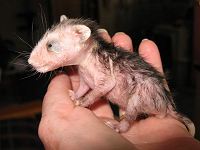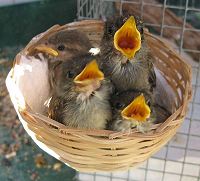| Over the last hundred years, the western world has undergone a dramatic shift from a rural society to urban technology. Today the only experience most people have with animals is with their domestic pets. | |||
 | It is no wonder wildlife knowledge and appreciation has declined. Susceptible to misinformation on methods of husbandry, wildlife conservation, disease fact distortion - especially when sensationalized by the media - often disturb the public more than the abstract problems they are designed to alleviate. | ||
Sensationalism, lack of proper education and extreme regulations spawn broad misunderstandings and complicates efforts to find remedies for genuine problems. This group, made fearful, will be the ones to call the state or pest control each time they see any wild animal near their home. They will shoot, trap, poison and harm at any opportunity. Their fear and actions result in wasted agency time, challenges for rehabilitators, harm to other innocent animals, and a new generation of people who will inherently also live in fear as a result of ignorance. | |||
| |||
The caring group truly needs educated just as badly. Only proper education can provide any such knowledge. This group has not and will not comply, nor buy the all-out disease distorted brainwashing. This group must be made to understand the risks to the actual wild animal, the risk to their own domestic pets, and further - giving them opportunity in HOW to truly help wildlife will best serve them – and wildlife. While every person can’t be educated as such, and every animal can’t be helped, for even one person or one animal, it can make ALL the difference in their world. | |||
Jul 5, 2009
Wildlife Appreciation
Subscribe to:
Comments (Atom)


